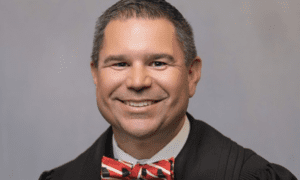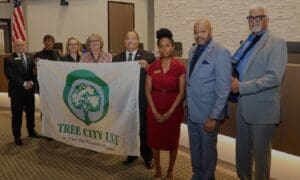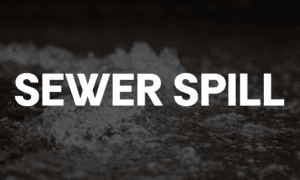Dozens demand answers, changes during hearing on stormwater fees; Brown: March 4 meeting may air alternatives to fees
They came angry and they came agitated, in no mood to hear why Fayette County was assessing a new stormwater fee on residents, businesses and churches in the unincorporated county.
Despite the contentious atmosphere in an overcrowded large meeting room Feb. 13, citizens got their chance to vent and suggest other ideas for funding the repair and replacement of miles upon miles of corrugated metal stormwater pipe that runs underneath roads.
It wasn’t easy from the get-go, as new County Administrator Steve Rapson began with a brief presentation on stormwater infrastructure and funding that included video of a road washing out, its pavement being swallowed up by the ground due to a failed stormwater pipe. Someone in the audience asked where the video was from.
“Maine” was the response, which elicited cackles of derisive laughter from a significant number of audience members.
The video is pertinent to Fayette County because it is this type of problem the county is trying to prevent with its stormwater program, Rapson noted. By being proactive, the county can repair many pipes before a road might wash out, thanks to a leaky, rusted pipe laying underneath, Rapson said.
“You want the police department and fire department to show up,” Rapson said. “They can’t do that if the road erodes because the stormwater infrastructure has not been repaired.”
Rapson in his presentation explained that the county’s stormwater infrastructure is aging, creating problems that need to be addressed, similar to replacing the roof on a home every 10 to 15 years. In this case, the corrugated metal stormwater pipes have a life expectancy of 25 years, and many are starting to reach that age all over the unincorporated county.
Furthermore, Rapson said, the county has to meet multiple federal and state mandates, which come without outside funding, to prevent flooding and also keep a watch on stormwater quality.
Rapson presented photos of failing stormwater pipe and other stormwater structures in need of repair. A recent repair on Kirkley Road cost $229,000, and a fix on Merrydale Drive cost $92,000, Rapson said.
The county is looking at an estimated $15 million to fix all of its stormwater problems over the coming years. The stormwater billing system is projected to net $643,000 in revenue this year, and so far some 66 percent of residents have already paid their bill in full for a total revenue of $426,570, according to Rapson.
That prompted two residents in the audience to shout in unison: “Give it back!”
Among the ideas from residents during the meeting was a proposal to extend the stormwater fee to all county residents, including those in Peachtree City and Fayetteville, which both already have their own stormwater utilities. Brown had previously said that was the main reason city residents weren’t included in the county’s stormwater utility, adding that the county is not proposing to fix stormwater problems in either city.
“City people also use our roads,” said one resident who was upset with the burden being on unincorporated residents only. “It’s not fair and we can’t afford it either.”
Brown later noted that such a plan would essentially double-tax city residents for the same service.
Peachtree City property owners recently got the news that their city-assessed stormwater fees would be more than doubling in many cases this year. The City Council is scheduled to vote this week on floating a $9.48 million bond issue to pay for repairs to the city’s stormwater system. (See related story above.)
A number of other residents argued that the county should remove the stormwater fee and add the stormwater costs to property tax bills so at least the homeowner would be able to get a state and federal tax deduction for the increased expenses.
Several residents criticized the use of impervious surface calculations to determine each property owner’s stormwater bill. Others were critical of not having the funding brought to them as a question in the November election.
A handful of residents condemned county spending in other areas, saying the government needed to trim its regular budget to fund the necessary stormwater repairs.
Brown insisted that significant, steep cuts are coming for the county’s budget and while his suggestion to repurpose money from the West Fayetteville Bypass to other projects failed, he is willing to take the heat now “because the county screwed up.”
“We cannot afford for our roads to collapse,” Brown said.
As for property taxes, Brown said the commission will not raise the county’s millage rate as a number of budget cuts are coming to prevent such an increase.
“You are going to see some drastic changes, I promise you,” Brown said, referencing about three pages worth of cuts he has proposed for the first budget meeting.
In his interactions with residents who brought up specific stormwater problems, Brown’s standard response was to volunteer to visit with the property owner to help resolve the situation. While it became a running joke to some, by the end of the meeting the crowd was using that punch line in a somewhat friendly manner.
One homeowner, who lives on Ellison Road, noted that he has a significant retention pond on his property which also detains stormwater from other adjacent parcels, but he will get no credit for that on his stormwater bill, although he would qualify for a credit for having rain barrels.
Brown said he agreed that such issues needed to be addressed.
Another homeowner complained that he got a $1,300 stormwater bill even though he has a 12-acre lake that impounds rainwater and drains into the Flint River.
Resident John E. Jones of Lawson Lane asked Brown to commit to canceling the recent stormwater fee at the next commission meeting and devise another way to fund the stormwater repairs.
“I can’t commit to doing it at the next meeting,” Brown said, noting that he couldn’t add it to the agenda for the following evening’s meeting. “We are taking these things into account, and it took four months to get a system in place today. We are taking everything into account … We will look at everything to figure out what we need to do.”
The commission got nearly three hours of feedback last Wednesday at this meeting, and each commissioner was present to hear all the criticism.
The next stormwater town hall meeting is slated for Monday, March 4, in the commission chambers at the county government complex in downtown Fayetteville. Rapson said that at that meeting staff will address pros and cons of various solutions to fund stormwater system repairs.
Rapson noted that county staff has been instructed to hold off on issuing any surcharges and penalties for any late stormwater bills. He also said the county would avoid putting liens on anyone’s property for not paying their stormwater bill.
If the commission decides to ax the stormwater utility fee, the county has records of how much each property owner has paid and refunds would be issued, Rapson noted.











Leave a Comment
You must be logged in to post a comment.